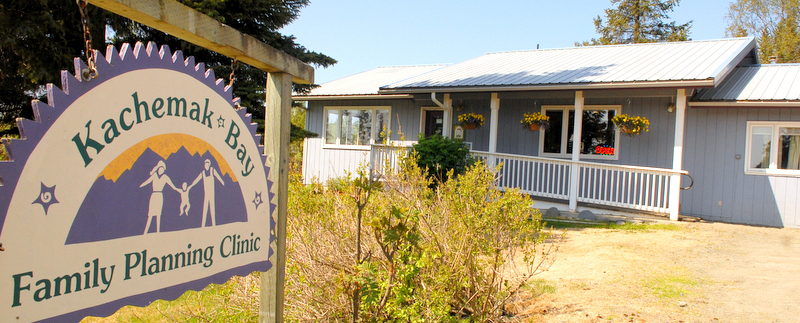In terms of history, not only is the Kachemak Bay Family Planning Clinic celebrating its 30th birthday this year, it’s also an organization that got started in some pretty historic buildings, too. Founded in 1983, its first clinics were held in the Sam and Vega Pratt House on Pioneer Avenue, built in 1941. About 1989, it moved into the Wythe house on Main Street, a pre-statehood building.
“It was very quaint with beautiful cottonwood molding around all the door and window frames,” said longtime board member Melon Purcell.
Since 2002, KBFPC has been in its current location on Ben Walters Lane. The clinic was started by people like Gail Radcliffe and Susan Arndt, both nurses, to provide reproductive health care and services to women. It met in a front room once a week at the Pratt House, providing birth control and reproductive health care exams.
“They wanted to have affordable women’s health care,” Purcell said. “They saw the need in the community, and kind of brainstormed it and put it together.”
“You have a great story of a handful of hard-working volunteers who got it off the ground,” said Heather O’Connor, only the third executive director in the clinic’s history. O’Connor took over from longtime director Michelle Waneka in October 2012.
“It was founded by volunteers and supported by volunteers,” said Kim Smith, who became the first director in the late 1980s.
KBFPC’s core mission has expanded over the years to include services like well-woman exams, clinical breast exams and mammograms, and, for men and women, sexually transmitted disease testing and counseling and HIV testing and counseling. Men also can get free condoms and low-cost vasectomies.
Through the clinic, at bars, liquor stores, and restaurants, and at the Anchor Point and Homer food pantries, KBFPC distributes 10,000 condoms a year.
A grassroots organization not affiliated with any national group, the clinic serves about 950 women and 60 men a year. Until Seldovia Village Tribe Health Clinic opened in 2005, KBFPC was the only local health clinic that offered free and reduced health care, said Morgan Sicilia, board president.
“It is still the only clinic in the area that will not turn a client away due to their inability to pay,” she said.
“The clinic provided a location and service for women to try to plan their families, to try to ensure that they would be the healthiest they could be,” Smith said of the early days.
Back then, KBPFC relied on a lot of donations from people upgrading their equipment, Purcell said, like old blood-pressure cuffs. She remembered when Nell Gustafson donated the clinic’s first computer.
“We all thought we had died and gone to heaven,” Purcell said.
Waneka became the second clinic employee, first serving as clinic manager. She later became executive director in 1999.
Smith said that in the late 1980s Homer had a teenage pregnancy crisis. In the early 1990s, HIV and AIDS also became an issue. KBFPC started the RARE-T, or Reducing AIDS Risk Effectively in Teens, program, training youth to educate their peers.
The modern equivalent of peer education is PHAT, Promoting Health Among Teens, a program run through the R.E.C. Room, housed in a building next to the clinic offices on Nielsen Circle. The R.E.C. Room — for Resource Enrichment Co-op — provides a safe place for young people to hang out, play games, play music and do programs like the FOrk (Fresh Organic Kitchen) Club. Youth on Record also offers digital music production classes.
Throughout its history, KBFPC has emphasized providing quality information on reproductive health, particularly to teenagers.
“A lot of what we try to do here is make sure people know what the facts are, and that they are getting actual, factual information, instead of the plethora that’s out there on the internet,” O’Connor said.
With better birth-control methods like long acting, reversible contraception, the clinic has seen a drop in the number of walk-in pregnancy tests, down, from 393 in 2004 to 240 in 2012. KPFPC isn’t just about preventing pregnancies, but helping couples with pre-conception counseling.
“People are super-planning those pregnancies, making sure they’re giving their whole body and everything the best possible odds,” said clinic manager Catriona Lowe.
One effect of better birth control has been clients not coming in as often, O’Connor said. The clinic encourages women to do an annual well-women exam.
The Affordable Care Act also has lead to some changes at the clinic. Clinic staff are now certified application counselors — “walking encyclopedias on ACA,” O’Connor said.
Kachemak Bay Family Planning Clinic
3959 Ben Walters Lane
235-3436
www.kbfpc.org
Heather O’Connor, executive director
Catriona Lowe, clinic manager
Dr. Hillary Seger, medical director
R.E.C. Room
(Youth Resource and Enrichment Co-Op)
3957 Nielsen Circle
235-6736
Anna Meredith, youth program manager
Doug Koester, youth program manager
Founded 1983
Former locations: Pratt House, Pioneer Avenue; Wyeth House, Main Street
Moved to current location, spring 2002
Clinical services:
• well-woman exams
• clinical breast exams and mammogram referrals
• birth control consulting and supplies
• emergency contraception
• sexually transmitted disease testing
• HIV testing and counseling
• pregnancy testing
• low-cost vasectomies
R.E.C. Room services:
• Promoting Health Among Teens (PHAT) program
• after-school youth hangout
• computer, wifi, games, art supplies
• Xbox
• slam poetry workshops
• FORK club cooking classes
• Youth on Record digital music production


